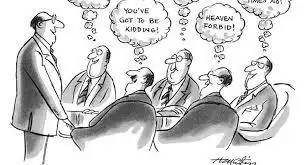THE ABILENE PARADOX
If everyone thinks it’s a bad idea, no one will do it — right?
Not so fast.
In 1974, professor and management expert Jerry B. Harvey introduced an interesting quirk of group agreement. He called it “the Abilene paradox.” It describes the tendency of people to go along with what they think the group wants to do — even when they themselves don’t want to do it. And it happens more often than you’d imagine.
To illustrate this phenomenon, Harvey recalls the following story:
A family is playing a game together on a hot summer day. The father-in-law suggests that they drive from their hometown of Coleman to Abilene, Texas — about 53 miles away. The wife says it sounds good, the husband agrees, and the mother-in-law says she’ll go along too.
They take a hot, dusty ride to a mediocre restaurant, then take another long drive back home to Coleman. When they arrive, recovering in front of the fan, the husband politely (and disingenuously) says, “Great trip, right?” His mother-in-law says, “To be honest, I would rather have stayed home.” The wife agrees, and the father-in-law confesses the same. Turns out, he only suggested it because he thought they would all be bored staying home.

